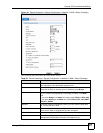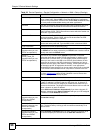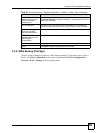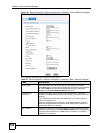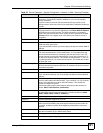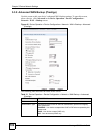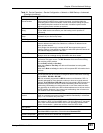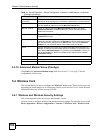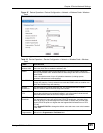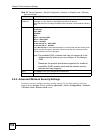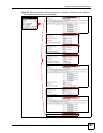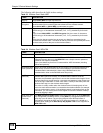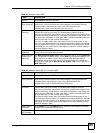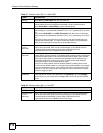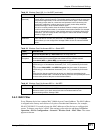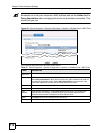
Chapter 5 Device Network Settings
Vantage CNM User’s Guide
105
Figure 47 Device Operation > Device Configuration > Network > Wireless Card > Wireless
Card
The following table describes the fields in this screen.
Table 32 Device Operation > Device Configuration > Network > Wireless Card > Wireless
Card
LABEL DESCRIPTION
Enable
Wireless LAN
You should configure some wireless security when you enable the wireless LAN.
Select the check box to enable the wireless LAN.
ESSID The ESSID (Extended Service Set IDentification) is a unique name to identify the
device in the wireless LAN. Wireless stations associating to the device must have the
same ESSID.
Enter a descriptive name of up to 32 printable characters (including spaces;
alphabetic characters are case-sensitive).
Hide ESSID Select this check box to hide the ESSID in so a station cannot obtain the ESSID
through AP scanning. Or don’t select this to make the ESSID visible so a station can
obtain the ESSID through AP scanning.
Choose
Channel ID
The radio frequency used by IEEE 802.11a, b or g wireless devices is called a
channel. Select a channel from the drop-down list box.
Enable RTS/
CTS
Select this check box to enable RTS (Request To Send) and CTS (Clear To Send) to
reduce data collisions on the wireless network if you have wireless clients that are
associated with the same AP but out of range of one another..
RTS/CTS
Threshold
The RTS threshold (number of bytes) is for enabling RTS/CTS. Data with its frame
size larger than this value will perform the RTS/CTS handshake. A wireless client
sends an RTS for all packets larger than the number (of bytes) that you enter here.
Set the RTS/CTS equal to or higher than the fragmentation threshold to turn RTS/
CTS off.
Select Enable RTS/CTS to change the default value and enter a new value between
0 and 2432.
Enable
Fragmentation
Select this check box to enable fragmentation on a packet if it is over the frame size
defined in the Fragmentation Threshold field.



